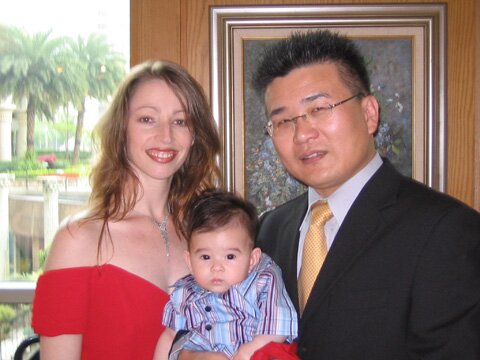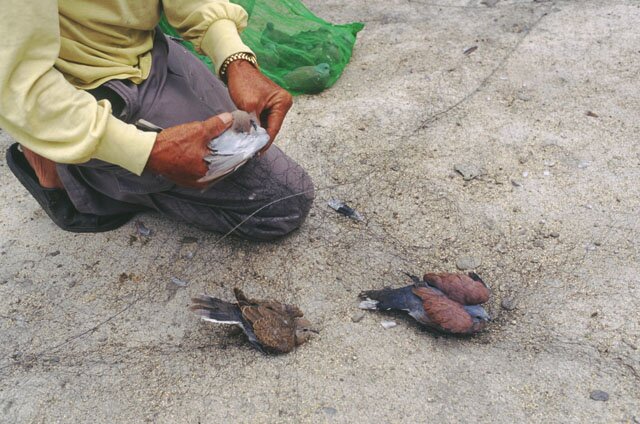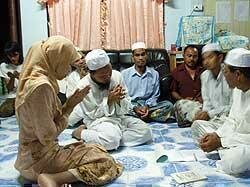BROWSE COUNTRIES/ TERRITORIES
I married a white chick
Marriages between Eastern men and Western women provide a look at what happens when worlds collide.
So much has been said and written about Westerners taking wives from the East. We’ve heard a million times that Japanese brides are the best housewives, Chinese girls are gentle, pretty and fragile like… well… like china and Thai women can make any man happy. This time, we won’t be discussing how reliable these assertions are; those of us who have lived in the East long enough know that women here may radically contradict common clichés. The thing is, while a marriage between a Western man and an Eastern woman has for centuries been widespread and commonly accepted, couples comprising an Asian man and a western girl used to be frowned upon by bigots and were rare. Today the number is growing. And yet, the subject of Western wives of Eastern men is nearly an uncharted area, even though cultural differences mixed with peculiarities of female psychology can be intriguing.
In Taiwan, more and more local men are longing to find a foreign wife; and more often they choose not a quiet and obedient girl from nearby China or Vietnam, but a loud redheaded Australian or a perky blue-eyed Russian. Taiwanese seem to be keener than any other Asian men to diverge from traditional, time-tested lifestyles and plunge into an unpredictable family adventure with emancipated western women. This unconventional way was pioneered by none other than the son of Generalissimo Chiang Kai-shek, Jiang Jing-guo, who married 19-year old Faina Vakhreva in 1935. A lot of things have changed since then, but the tendency only grew stronger, which is even more surprising in a country where traditionally men were the masters of the world and women were treated like slaves.
One of my Taiwanese male friends said that Western women are more fun to marry. They are stronger, prettier, express their thoughts directly and often provide better citizenship in case of need. “I would love to have a Western girlfriend”, he added. Not that he had any experience of marrying or even dating a girl from another culture. Reality can be much more challenging. It is one thing to hang out with a person from a different world; it is totally another to share a home with her.
However, I personally know dozens of Western women who have found their happiness with Taiwanese men. Sceptics say these women come here to marry businessmen for money. I say this is nonsense! Most of the women I know married average Taiwanese guys and just like many other women around the globe they take care of kids and the house and often work as much as their husbands, sharing all the ups and downs of family life.
Anna, a 21-year-old Russian met her husband Michael online. They dated for two years before they got married. They are the cutest couple one can imagine. Every time I see them, they look genuinely happy. “Well, we have our moments”, says Anna. “Sometimes I get jealous, or he shows bad temper, but it’s not because we’re from different cultures. My father-in-law – he's a traditional guy, you know, the head of the family and all, but Michael is more Americanised, I really don’t feel that he’s different from any man from the West, not that I knew that many.” Then she adds: “Actually, I think young Taiwanese men are gentler than Westerners and they take good care of their families.”

Anna and Michael
Anna speaks little Chinese, so they communicate in English in their family, but she hopes to pick up more Chinese soon. Language can be a problem. Few Taiwanese speak a foreign language well, and when they do it’s usually English, which is not native for most of the foreign wives in Taiwan. “Oh, who needs language," jokes another Russian woman married to a local guy, "It’s the language of love we’re speaking”. Jokes aside, after the honeymoon, one needs conversation to keep the marriage alive. Luckily, women seem to be more flexible and capable of picking up a foreign language.

Colleen and family
“It’s for the best sometimes", says Colleen, a 30-something New Zealander who’s married to a Taiwanese salesman and speaks some Chinese. "It’s difficult when you really can’t express what you want to say, but this language barrier can also be a good thing because you can’t tell each other off, so in that way, stupid little things are never said in haste. Also you have to state really clearly what you are feeling, so the other can understand; thus, things can actually be clearer than a same country marriage! And as for the difference in cultures I can say that obviously there are big differences, but that is the attraction. I love that my husband wants to take care of me and wants to treat me like a lady. An Australian man wouldn’t do that I can assure you!”
Angie, a perky freckled Canadian, met her husband at the resort town of Kending, where she was teaching English. She adores him, he spoils her. Sometimes, she shouts at him for working late, sometimes he nags at her for spending too much money. They are happy together. They have a house, a dog, two kids and are thinking about having a third. I don’t think she ever has time for discussing cultural differences between Taiwan and Canada except when she’s driving and then she discusses it loudly.
Veta, a Ukrainian girl who married very young, says that Taiwanese men are generally softer and less mature than their peers from western countries. “They also don’t drink," she notes, "not even at a New Year party.”
“My husband and I still spend a lot of time talking about culture issues six years into the marriage", adds Cheryl, a photographer from the US, who met her husband when he came to fix the phone in her Taipei apartment. "We fell in love, got married five years later, had a child and just live our lives like anyone else. I think that the divorce rate between Western women and Asian men might not necessarily be because of the traditional issues as much as the unwillingness of the western women to put up with the bad situations that can develop. Traditionally, husbands and wives in Taiwan have stuck it out even when there is really no marriage left. Even if they do get divorced, it is a secret. I think Western people, especially women, feel it is more important to communicate clearly with their partner, where that is not so often the case for Taiwanese, especially men.
It is generally considered that women are more flexible and are ready to sacrifice a lot for love and family. They learn the husband’s language, they adjust to traditions and culture, they tolerate more than a man would and they are ready to give up a number of things from their own culture.
Elena, a lovely young woman from Southern Russia, who finally agreed to a union with a Taiwanese man after 10 years of dating, says that her husband and her four-year old daughter refuse to eat Russian food. "So I’ve stopped cooking at home. It takes a lot off my shoulders, of course, but I really miss borscht sometimes."
"We try to celebrate Christmas as well as Chinese New Year," offers another American. "And though my husband’s family is very receptive and curious about the celebration, it’s still not the same."
"You know how boring their parties are," shares a Ukrainian girl. "We dance at parties but they don’t. And they always sing karaoke. But I can deal with that, really. Everyday family life is not about parties."
In modern society, cultural differences are not that conspicuous, especially to those who travel a lot and have been immersed in several different cultures. “In most cases, it’s not the question of cultural differences when a marriage fails," says an American in her 40s who’s been married to a Taiwanese for nearly 10 years. "It’s just that in interracial marriages it's easier to blame everything on that.”
So far, I have heard about only two failed Eastern man/Western woman marriages. My very good Russian friend Masha, who fell in love with a Taiwanese guy and just last year, got a quiet, yet unpleasant divorce from him. “Nothing to do with the culture," she says. "It’s just the guy turned out to be a jerk. Happens all the time… And also, his mother was very annoying.”
“The In-laws Question” is a very sensitive one with Western wives in Taiwan. A few years ago I briefly met a 40-something American woman. She was a divorcée and she swore that she would never again marry an Asian guy unless he’s an absolute orphan.
Scary stories about Chinese/Taiwanese mothers-in-law are known far beyond Asia; however, in many cases they prove to be false. Taiwanese mums of younger generations often readily accept a blue-eyed daughter-in-law, and help clean the house and baby sit.
“My in-laws were so happy when we got married" adds Veta. “They said that the kids would be beautiful.” And so they had two, right after the wedding.
“The husband’s family is a big issue for many couples and might be one of the obvious causes of marriages between Western women and Chinese men failing", says Cheryl, "but the reverse situations are frequent, too. In the end, it depends on the husband. This also can be affected by the husband's birth order, wheter he is the first, or last son. I’m really lucky, my in-laws are nice people and we don’t live together, but sometimes I wish we lived a bit closer to them for my son’s and my husband’s sake. Anyway, most of the in-laws are sweet people who are waiting impatiently for grandchildren and respect their son’s choice. There are exceptions, of course, but generally the times of terrorizing mothers-in-law are gone. My bigger concern is my son’s education.”
Cheryl is not the only one who is bewildered by the question of her children's future. Every single one of the women I talked to is worried about the choice that they have to make when their children start school. Naturally, they want the kids to be comfortable with the cultures and languages of both Mum and Dad.
Kids from such marriages usually speak at least two languages and have dual citizenship. Taiwanese consider them foreigners; expatriates think they’re almost local. They are neither here nor there. If not accepted at international schools (which are scarce and expensive), they slowly gravitate towards local culture to the dismay of their mothers.
“We try to maintain traditions and our language", says Elena, "We have parties and playgroup meetings for kids from such couples as often as possible, but it’s hard. As soon as kids go to school, they switch back to Taiwanese environment. The same thing with the family. Grandparents here speak Taiwanese and teach kids local traditions, my parents see my daughter once a year for a month. No wonder she speaks Russian with an accent. We hope that one day we’ll be able to establish a kindergarten for the kids from mixed marriages. At least, for the Russian speaking ones, because for English speakers it’s much easier. I don’t even want to think about junior high. I’m not sure we’ll ever find a tutor to teach our kids Russian literature or history.”
There’s also another big issue that happy families don't think about. Historically, Taiwanese law has been favouring men. Until 1985, Taiwanese men had exclusive rights to child custody and to all of the wife’s property, including her personal belongings. Today Taiwanese women’s rights activists conquer more judicial heights every year and yet foreign spouses are often left unprotected.
As the issue of foreign spouse abuse grows, Taiwanese lawmakers try to improve this situation by adding new rules and means of control, however, even at the state law level, foreign spouses receive unequal treatment.
For instance, in case of a divorce, a foreign wife without children is required to leave the country in two weeks, unless she has already accepted ROC citizenship or has Permanent Residency. These women cannot inherit their husbands' property if he dies and have problems obtaining legal custody of their children if they divorce. These situations give their husbands and in-laws the chance to take advantage of these women's helplessness to exploit them.
Currently, foreigners can apply for ROC citizenship after they have been married to local citizens for three years, but they must first relinquish their original nationality. If they do not wish to give up their citizenship, they can apply for permanent residency after they have been married for five years.
Western wives usually don’t think about this. Firstly, they feel the support of their own government; secondly, they usually don’t marry desperate peasants, who prefer to bring wives from South-east Asia as a substitute for free house help.
“Oh come on!" says one of my Russian friends married to a Taiwanese businessmen, "What can happen? We love each other so much. And even if it happens, don’t you think I’d be able to take care of myself?”
Related Story:
Photos from Colleen and Anna
- PEOPLE OF ASIA
- LIVES
- Outside Asia
- Australia
- Europe
- Russia
- North America
- Central Asia
- Taiwan
- North Asia
- Definition: Culture
- Religion and Practices
- Society, Class and Division
- The Asian Diaspora in Australia
- The Asian Diaspora in Europe
- The Asian Diaspora in the US/North America
- Cross-Cultural Marriage
- Jiang Jing-guo
Login or Register

- Asian Dynasties and History
- Conservation of the Environment
- Definition: Culture
- Economy and Economics
- Food and Recipe
- Geopolitics and Strategic Relations
- Health and Body
- Of Government and Politics
- Religion and Practices
- Social Injustices and Poverty Report
- Society, Class and Division
- Unrest, Conflicts and Wars

































 Another Point
Another Point From Jerusalem to the West Bank
From Jerusalem to the West Bank
Comments
Post new comment